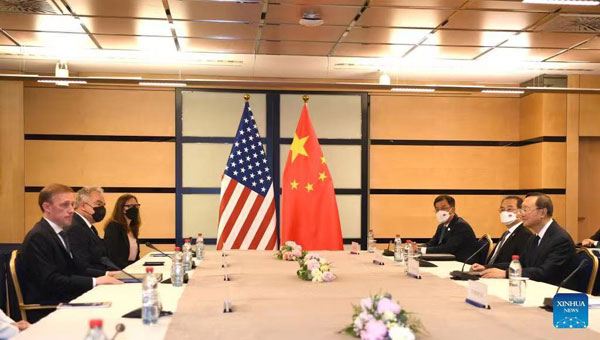Yang Jiechi Meets with U.S. National Security Advisor Jake Sullivan

On June 13, 2022 local time, Member of the Political Bureau of the CPC Central Committee and Director of the Office of the Central Commission for Foreign Affairs Yang Jiechi met with U.S. National Security Advisor Jake Sullivan in Luxembourg. The two sides had candid, in-depth and constructive communication and exchanges on China-U.S. relations and other issues of common concern, and agreed to focus on following through on the consensus reached by the heads of state of the two countries to strengthen contact and dialogue, reduce misunderstanding and miscalculation, and properly manage differences. Both sides agreed that it is necessary and beneficial to keep communication channels unimpeded.
Yang Jiechi pointed out, President Joe Biden has repeatedly said to President Xi Jinping that the United States does not seek a new Cold War with China; it does not aim to change China's system; the revitalization of its alliances is not targeted at China; the United States does not support "Taiwan independence"; and it has no intention to seek a conflict with China. China attaches great importance to this. However, for some time now, the United States has insisted on stepping up all-round containment and repression against China. Instead of solving the problems facing the United States, it has put China-U.S. Relations in a very difficult situation and greatly damaged bilateral exchanges and cooperation. This situation is not in the interests of China, the United States and the rest of the world.
Yang Jiechi said, China-U.S. relations stand at an important crossroads. The three principles of mutual respect, peaceful coexistence and win-win cooperation put forward by President Xi Jinping are the right way for China and the United States to get along with each other. The three principles serve the fundamental interests of the Chinese and American people and the common aspiration of the international community, and should be the fundamental guidance for the development of China-U.S. relations. China is ready to discuss ways and means to realize this vision with the United States. China firmly opposes the definition of China-U.S. relations by competition. The United States should put China in the right strategic perspective, make the right choice, and translate President Biden's remarks into concrete actions that the United States does not seek a new Cold War with China; it does not aim to change China's system; the revitalization of its alliances is not targeted at China; the United States does not support "Taiwan Independence"; and it has no intention to seek a conflict with China. The United States needs to work with China in the same direction to earnestly implement the important consensus reached by the two heads of state.
Yang Jiechi stressed that China's position on safeguarding national sovereignty and territorial integrity is unequivocal and firm. China's internal affairs brook no interference from other countries. Any attempt to obstruct or undermine China's national reunification will be doomed to failure. The Taiwan question concerns the political foundation of China-U.S. relations, and if it is not handled properly, it will have a subversive impact. This risk not only exists, but will continue to rise as the United States attempts to "use the Taiwan question to contain China" and the Taiwan authorities attempt to seek "Taiwan independence" by soliciting U.S. support. The United States should not have any miscalculation or illusion. It must abide by the one-China principle and the provisions of the three joint communiqués between China and the United States; it must prudently and properly handle questions related to Taiwan. Yang Jiechi also elaborated on China's solemn position on Xinjiang, Hong Kong, Xizang, the South China Sea, human rights, religion and other issues.
Yang Jiechi emphasized that the United States should have positive interactions with China and make joint efforts for the prosperity, stability and development of the Asia-Pacific region.
The two sides also exchanged views on international and regional issues such as the Ukraine issue and the Korean Peninsula nuclear issue.

Follow us on WeChat
京ICP备18041594号-1
京公网安备 11010202005508号

Follow us on WeChat


